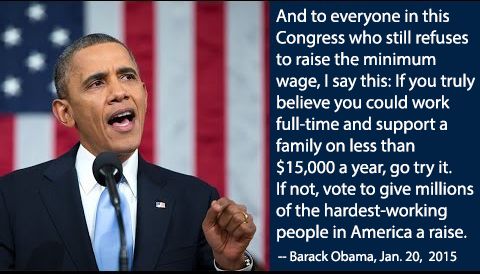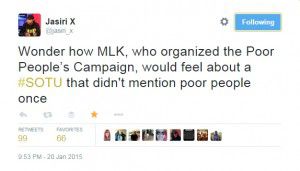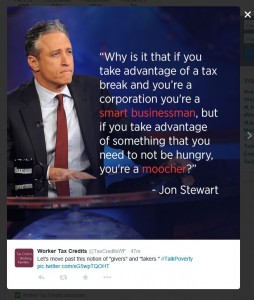 President Obama made some pretty bold statements in his 2015 State of the Union address. He proposed a number of policies that if passed would go far to help alleviate poverty and economic inequality in this nation.
President Obama made some pretty bold statements in his 2015 State of the Union address. He proposed a number of policies that if passed would go far to help alleviate poverty and economic inequality in this nation.
Among his ideas to strengthen “Middle Class economics” (as opposed to the grim failure of “trickle-down economics”):
But did he say enough about poverty and hunger? In fact he spoke those words only once, and it was in the context of global issues. He did not mention what’s happening right here at home – what one federal legislator, Sen. Bernie Sanders (D-VT), pointed out that evening:

Of course, Pres. Obama is in a difficult position as a politician. He can’t very well speak to America’s growing poverty and inequality without his opponents, and voters, blaming him for it. Obama instead chose to trumpet how the nation has risen from the depths of the Great Recession that gripped this country when he took office, and to call for specific policy measures that would lift it much further.
Because the so-called economic recovery thus far hasn’t benefited all Americans (and has widened inequality along racial and ethnic lines). According to Sen. Sanders, since 2005, the average family in the top 1% has seen its wealth nearly triple, increasing from $5 million to $14 million. But in that same time the typical middle class family has seen its wealth decrease by more than 1/3.
The tax policy changes Pres. Obama proposed in his address would go far to address rampant inequality while improving the overall economy, according to the Center on Budget and Policy Priorities. The revenue that would be raised by the president’s plan to increase taxes for the richest of the rich would “not only benefit large numbers of middle- and lower-income working families but also increase work, educational attainment, and retirement savings — thereby making the labor force larger and more productive and thus promoting long-term economic growth.”
 Many call this kind of wealth redistribution “class warfare”. But government subsidies – in the form of tax breaks – shouldn’t just benefit the rich, as they do now. Higher taxes on those who can well afford it will allow for the necessary investments in America’s working families that will benefit everyone in this nation.
Many call this kind of wealth redistribution “class warfare”. But government subsidies – in the form of tax breaks – shouldn’t just benefit the rich, as they do now. Higher taxes on those who can well afford it will allow for the necessary investments in America’s working families that will benefit everyone in this nation.
But Pres. Obama faces a Republican-majority Congress, a party that perpetually rails against raising taxes or eliminating tax breaks for the rich. Many GOP members have spent the past six years opposing various efforts to raise the minimum wage and to protect safety net and healthcare benefits for the poor and unemployed. In fact, the GOP leadership – as stated in Senator Joni Ernst (IA) State of the Union response – claim they were elected to pursue more of the same and are vowing to continue the GOP’s war against Obamacare, which would undoubtedly drive up uninsurance rates and medical costs among Americans.
Is progress on Obama’s policy goals in his remaining two years in office unlikely? We’ll see.
In the meantime, let’s harken back to what is perhaps the greatest piece of progressive thought ever articulated by a President of the United States. The January 1944 State of the Union address given by FDR (while the nation was embroiled in World War II) would come to be known as the “Economic Bill of Rights speech” because of the following section:
We have come to a clear realization of the fact that true individual freedom cannot exist without economic security and independence. “Necessitous men are not free men.”
People who are hungry and out of a job are the stuff of which dictatorships are made.
In our day these economic truths have become accepted as self-evident. We have accepted, so to speak, a second Bill of Rights under which a new basis of security and prosperity can be established for all regardless of station, race, or creed.
Among these are:
The right to a useful and remunerative job in the industries or shops or farms or mines of the Nation;
The right to earn enough to provide adequate food and clothing and recreation;
The right of every farmer to raise and sell his products at a return which will give him and his family a decent living;
The right of every businessman, large and small, to trade in an atmosphere of freedom from unfair competition and domination by monopolies at home or abroad;
The right of every family to a decent home;
The right to adequate medical care and the opportunity to achieve and enjoy good health;
The right to adequate protection from the economic fears of old age, sickness, accident, and unemployment;
The right to a good education.
All of these rights spell security. And after this war is won we must be prepared to move forward, in the implementation of these rights, to new goals of human happiness and well-being.
America’s own rightful place in the world depends in large part upon how fully these and similar rights have been carried into practice for our citizens. For unless there is security here at home there cannot be lasting peace in the world.”
– Franklin D. Roosevelt, Jan. 11, 1944
Imagine if our nation and its leaders had this kind of understanding and commitment today. What a world it could it be.




No comments yet.